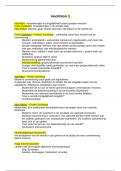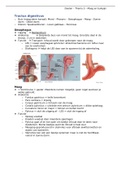European Tax Law
General European Union Law and Taxation
Sources of EU Law
- Primary Law: supreme source of law in the EU
o it consists mainly of the founding treaties of the EU
o TEU and the TFEU
o Treaty of Paris
o Treaties of Rome
o Maastricht Treaty
- Secondary Law: body of law that comes from the principles and objectives of the
treaties
o Regulations - Art 288 s2 TFEU
General automatic and uniform application
Binding
Directly applicable
Entry into force subject to publication
o Directives – Art 288, s3 TFEU
Addressed to MS
Binding as to the result to be achieved, but the national authorities
have the choice of form and methods
Entry into force subject to publication
Directly applicable
o Decisions – Art 288 s4
Addressed to the MS or natural or legal persons
Address situations specific to those MS
Binding in their entirety only on to whom they are addressed
Entry into force upon notification
Non-binding
o Recommendations and opinions – 288 s5
Do not confer any rights or obligations on those to whom they are
addressed
May provide guidance as to the interpretation of EU law
- Supplementary sources: elements of law not specifically mentioned in the treaties
o Case law
o International law
o General principles of law: unwritten sources of law developed by the case law
of the CJEU
- Effectiveness of EU law
,1. Direct effect
2. Primacy of EU law over any level of national or bilateral law
3. Consistent interpretation of EU law
4. Safeguard mechanisms
5. Principle of state liability for damages caused by serious breaches of EU law
by and public authority
6. Procedural principal of effectiveness: adequate national procedural
possibilities for individuals to. Effect their rights derived from EU law
o Direct effect
Concept: individuals may immediately invoke a European provision
before a national or European court
Conditions: the obligations must be precise, clear and unconditional
and that they do not call for additional measures, either national or
European (Van Gend en Loos)
Categories: vertical direct effect (individuals vs MS) or horizontal
direct effect (individuals vs individuals)
Applies to primary law
Secondary law:
Regulations: always have direct effect (Politi case)
Directives: have vertical direct effect – MS are obliged to
implement directives. No horizontal direct effect. No inverse
vertical direct effect – they may not be cited by an EU country
against an individual
Decisions: have direct effect when they refer to an EU country
as the addressee
o Primacy of EU law
Costa v ENEL union law has primacy over any conflicting domestic
law. National provisions that are in conflict with EU law must be
amended or abolished in order to comply with EU law
The precedence of EU law over national laws is absolute. Therefore, it
applies to all European acts with a binding force, whether emanating
from primary or secondary legislation
o Consistent interpretation of EU law
Consistent interpretation requires national courts of MS to interpret
national law consistently with EU law
Especially relevant when the Directives have not been implemented
timely or have been so incorrectly – the implementation failure
cannot benefit the defaulting state
Even when the Directives have been transposed into national law,
national courts are required to interpret their national provisions in
the light of the wording and the purpose of the directives
CJEU’s role preliminary ruling (art 267 TFEU)
, Enables national courts to question CJEU on the interpretation
or validity of EU law
It is binding on the referring court and on all courts in EU
countries
This mechanism enables uniform interpretation and
application of EU law in all MS
o Safeguarding mechanisms (when MS fail to apply EU law)
Infringement procedures – A258 to 260 TFEU
Action for annulment – A263 and 264 TFEU
Action for failure to act – A265 and 266 TFEU
Preliminary ruling – A267 TFEU
This procedure issued in cases where the interpretation or
validity of an EU law is in question and where a decision is
necessary for a national court to give judgment;
National court from which decisions there is not higher appeal
must refer a question to the ECJ when a question on the
interpretation of EU law arises.
This obligation ceases in case of acte clair – acte clair doctrine:
C-283/81 (Cilfit Case):
o If the question is not relevant (the answer to that
question, regardless of what it may be, can in no way
affect the outcome of the case);
o If the question raised is materially identical with a
question which has already been the subject of a
preliminary ruling in a similar case;
o If the correct application of EU law is so obvious as to
leave no scope for any reasonable doubt.
, EU non-contractual liability – A268 TFEU
o MS liability for damages caused by serious breaches of EU law by any public
authority
Liability of MS for incorrect, late or non-implementation of Directives
but it also applies to breaches of all categories of primary and
secondary EU law
CJEU sets the conditions for MS liability (Francovich and Brasserie du
Pecheur)
The result prescribed by the Directive implies the granting of
rights to individuals
The content of those rights must precise and unconditional
Existence of causal link between the breach of MS’s obligation
and the harm suffered by the injured parties
The breach of EU law must be sufficiently serious
- Foundations of EU tax law
o Art 26 TFEU: the internal market shall comprise an area without internal
frontiers in which the free movement of good, persons, services and capital is
ensured in accordance with the provisions of the Treaties
o Tax obstacles to the proper functioning of the internal market. Examples:
Differential treatment of domestic and imported goods and services;
Tax burdens on the migration of (natural and legal) persons;
Differential tax treatment of resident and nonresident taxpayers;
Differential tax treatment of domestic and foreign investment
income;
(especially for large businesses): having to comply with 28 different
tax administrations, and 28 different sets of substantive and
procedural tax law;
International economic or juridical double taxation of the same tax
base as a result of differences on income characterization, tax
accounting, transfer pricing rules, etc
o EU provisions on tax matters
Customs union (arts. 3(1)(a) and 30 of TFEU): exclusive competence
of EU; total prohibition between MS of import and export duties and
any charges having an effect equivalent to a customs duty.
Indirect taxes (art. 110 - 113 TFEU):
Prohibition of discriminatory taxation of foreign products and
protective taxation of domestic production.
Advanced harmonization of the general consumption taxes.
Prohibition of State aid (art. 107 TFEU): Code of Conduct for business
taxation.
General European Union Law and Taxation
Sources of EU Law
- Primary Law: supreme source of law in the EU
o it consists mainly of the founding treaties of the EU
o TEU and the TFEU
o Treaty of Paris
o Treaties of Rome
o Maastricht Treaty
- Secondary Law: body of law that comes from the principles and objectives of the
treaties
o Regulations - Art 288 s2 TFEU
General automatic and uniform application
Binding
Directly applicable
Entry into force subject to publication
o Directives – Art 288, s3 TFEU
Addressed to MS
Binding as to the result to be achieved, but the national authorities
have the choice of form and methods
Entry into force subject to publication
Directly applicable
o Decisions – Art 288 s4
Addressed to the MS or natural or legal persons
Address situations specific to those MS
Binding in their entirety only on to whom they are addressed
Entry into force upon notification
Non-binding
o Recommendations and opinions – 288 s5
Do not confer any rights or obligations on those to whom they are
addressed
May provide guidance as to the interpretation of EU law
- Supplementary sources: elements of law not specifically mentioned in the treaties
o Case law
o International law
o General principles of law: unwritten sources of law developed by the case law
of the CJEU
- Effectiveness of EU law
,1. Direct effect
2. Primacy of EU law over any level of national or bilateral law
3. Consistent interpretation of EU law
4. Safeguard mechanisms
5. Principle of state liability for damages caused by serious breaches of EU law
by and public authority
6. Procedural principal of effectiveness: adequate national procedural
possibilities for individuals to. Effect their rights derived from EU law
o Direct effect
Concept: individuals may immediately invoke a European provision
before a national or European court
Conditions: the obligations must be precise, clear and unconditional
and that they do not call for additional measures, either national or
European (Van Gend en Loos)
Categories: vertical direct effect (individuals vs MS) or horizontal
direct effect (individuals vs individuals)
Applies to primary law
Secondary law:
Regulations: always have direct effect (Politi case)
Directives: have vertical direct effect – MS are obliged to
implement directives. No horizontal direct effect. No inverse
vertical direct effect – they may not be cited by an EU country
against an individual
Decisions: have direct effect when they refer to an EU country
as the addressee
o Primacy of EU law
Costa v ENEL union law has primacy over any conflicting domestic
law. National provisions that are in conflict with EU law must be
amended or abolished in order to comply with EU law
The precedence of EU law over national laws is absolute. Therefore, it
applies to all European acts with a binding force, whether emanating
from primary or secondary legislation
o Consistent interpretation of EU law
Consistent interpretation requires national courts of MS to interpret
national law consistently with EU law
Especially relevant when the Directives have not been implemented
timely or have been so incorrectly – the implementation failure
cannot benefit the defaulting state
Even when the Directives have been transposed into national law,
national courts are required to interpret their national provisions in
the light of the wording and the purpose of the directives
CJEU’s role preliminary ruling (art 267 TFEU)
, Enables national courts to question CJEU on the interpretation
or validity of EU law
It is binding on the referring court and on all courts in EU
countries
This mechanism enables uniform interpretation and
application of EU law in all MS
o Safeguarding mechanisms (when MS fail to apply EU law)
Infringement procedures – A258 to 260 TFEU
Action for annulment – A263 and 264 TFEU
Action for failure to act – A265 and 266 TFEU
Preliminary ruling – A267 TFEU
This procedure issued in cases where the interpretation or
validity of an EU law is in question and where a decision is
necessary for a national court to give judgment;
National court from which decisions there is not higher appeal
must refer a question to the ECJ when a question on the
interpretation of EU law arises.
This obligation ceases in case of acte clair – acte clair doctrine:
C-283/81 (Cilfit Case):
o If the question is not relevant (the answer to that
question, regardless of what it may be, can in no way
affect the outcome of the case);
o If the question raised is materially identical with a
question which has already been the subject of a
preliminary ruling in a similar case;
o If the correct application of EU law is so obvious as to
leave no scope for any reasonable doubt.
, EU non-contractual liability – A268 TFEU
o MS liability for damages caused by serious breaches of EU law by any public
authority
Liability of MS for incorrect, late or non-implementation of Directives
but it also applies to breaches of all categories of primary and
secondary EU law
CJEU sets the conditions for MS liability (Francovich and Brasserie du
Pecheur)
The result prescribed by the Directive implies the granting of
rights to individuals
The content of those rights must precise and unconditional
Existence of causal link between the breach of MS’s obligation
and the harm suffered by the injured parties
The breach of EU law must be sufficiently serious
- Foundations of EU tax law
o Art 26 TFEU: the internal market shall comprise an area without internal
frontiers in which the free movement of good, persons, services and capital is
ensured in accordance with the provisions of the Treaties
o Tax obstacles to the proper functioning of the internal market. Examples:
Differential treatment of domestic and imported goods and services;
Tax burdens on the migration of (natural and legal) persons;
Differential tax treatment of resident and nonresident taxpayers;
Differential tax treatment of domestic and foreign investment
income;
(especially for large businesses): having to comply with 28 different
tax administrations, and 28 different sets of substantive and
procedural tax law;
International economic or juridical double taxation of the same tax
base as a result of differences on income characterization, tax
accounting, transfer pricing rules, etc
o EU provisions on tax matters
Customs union (arts. 3(1)(a) and 30 of TFEU): exclusive competence
of EU; total prohibition between MS of import and export duties and
any charges having an effect equivalent to a customs duty.
Indirect taxes (art. 110 - 113 TFEU):
Prohibition of discriminatory taxation of foreign products and
protective taxation of domestic production.
Advanced harmonization of the general consumption taxes.
Prohibition of State aid (art. 107 TFEU): Code of Conduct for business
taxation.











